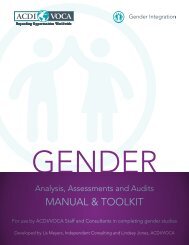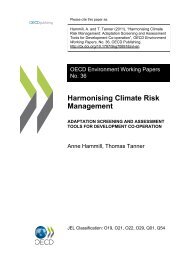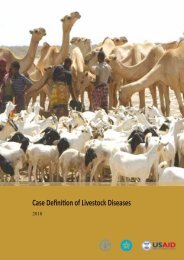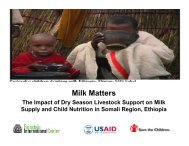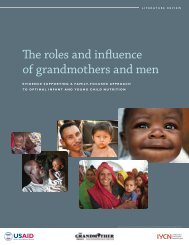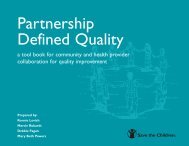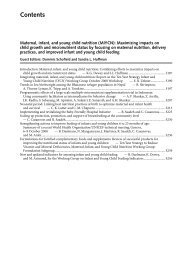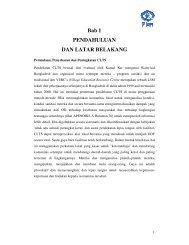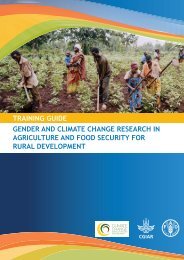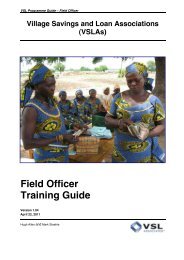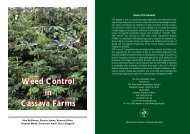WFP Gender Policy - WFP Remote Access Secure Services
WFP Gender Policy - WFP Remote Access Secure Services
WFP Gender Policy - WFP Remote Access Secure Services
- No tags were found...
You also want an ePaper? Increase the reach of your titles
YUMPU automatically turns print PDFs into web optimized ePapers that Google loves.
RATIONALE5. <strong>Gender</strong> inequality is a major cause and effectof hunger and poverty: it is estimated that60 percent of chronically hungry people arewomen and girls; 20 percent are childrenunder 5. 3 Achieving gender equality remainscrucial to reaching the poverty and hungergoals of the Millennium Declaration.6. <strong>WFP</strong>’s past gender policies recognized thisand focus on women’s roles in ensuringhousehold food security. 4 Positive measuresfor women must therefore continue in <strong>WFP</strong>operations but a more holistic approach togender is needed that improves the balancein relationships between genders and infamilies.7. This is partly a result of new challenges andopportunities for gender equality: for example,changes in the dynamics of the HIV/AIDSpandemic have prompted <strong>WFP</strong> to scale up itsresponse and to pay particular attention tomainstreaming a gender dimension intoHIV/AIDS programming. 58. <strong>WFP</strong>’s mission is also becoming increasinglydifficult as a result of climate change, given thehigh proportion of hungry people living indeveloping countries that are affected byclimate change and yet have minimal capacityto adapt. 6 <strong>WFP</strong> is strengthening its capacity torespond to the challenges related to climatechange, including its response to the differentneeds and coping mechanisms of women,men, boys and girls. For example, ininequitable societies, women are morevulnerable to natural disasters than menbecause of socially constructed gender rolesand behaviours that affect their access toresources. 79. High food prices and the current globalfinancial crisis exacerbate vulnerability to foodinsecurity 8 and are negating some gains madein addressing food and nutrition insecurity. Theimplications are different for men and women,so care is needed in designing policies andactions to address the situation.10. Violence against women and girls has escalatedin recent years, resulting in a global call foraction. Much of this violence is occurring inconflict and post-conflict countries where <strong>WFP</strong>has large operations. The Secretary-General’s3 United Nations. 2007. Report of the Secretary-General: Strengthening Efforts to Eradicate Poverty and Hunger, including through the Global Partnership for Development(E/2007/71). New York. According to the Food and Agriculture Organization of the United Nations (FAO) the number of undernourished people as of December 2008 was963 million (see: www.fao.org/news/story/en/item/8836/icode/).4 Research shows that improving the status of women results in positive outcomes for women and their families. Improvements in women’s education have been linked toreductions in child malnutrition rates (Smith, L.C. and Haddad, L. 2000. Explaining Child Malnutrition in Developing Countries: A Cross-Country Analysis. Washington DC,International Food <strong>Policy</strong> Research Institute (IFPRI). Household food security tends to improve if women are given equal access to resources. See IFPRI. 2000. Women:The Key to Food Security: Looking into the Household. Washington DC.5 <strong>WFP</strong>. 2006. Getting Started: HIV, AIDS and <strong>Gender</strong> in <strong>WFP</strong> Programmes. Rome.6 <strong>WFP</strong> and Columbia University. 2008. Climate Change in West Africa: Recommendations for Adaptation and Mitigation. New York.7 Neumayer, E. and Pluemper, T. 2007. The <strong>Gender</strong>ed Nature of Natural Disasters: The Impact of Catastrophic Events on the <strong>Gender</strong> Gap in Life Expectancy, 1981–2002. Availableat http://ssrn.com/abstract=874965.8 FAO. 2008. Soaring Food Prices: Facts, Perspective, Impact and Actions Required (HLC/08/INF/1). Document from the High-Level Conference on World Food Security:The Challenges of Climate Change and Bioenergy. 3 5 June 2008. Rome.7



